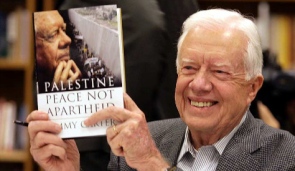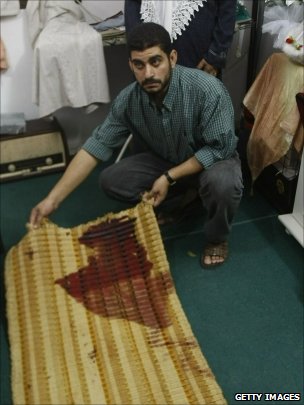Carter in new book: Obama turned back on settlement freeze: Haaretz
The former U.S. president also criticizes Bill Clinton, writing that Israeli settlement building in the West Bank was especially rapid under his administration.
In his new book, former United States president Jimmy Carter criticizes President Barack Obama over his policy on Israel’s settlement freeze, writing that the President has backed away from his initial commitment to a complete halt to building in West Bank settlements.
The Associated Press purchased a copy of Carter’s book, White House Diary, on Friday, ahead of its release Monday.

Carter also criticizes fellow Democrat and former president Bill Clinton over his policy on Israel settlement expansion, writing that settlement building was especially rapid during Clinton’s administration.
This past week, the newspaper Asharq Al Awsat reported that the Obama administration has suggested Israel extend the current moratorium on construction in West Bank settlements, which is set to expire on September 26, for an additional three months.
The expiration date for the settlement freeze has loomed over the recently re-launched direct peace talks between Israel and the Palestinians. The Palestinians have threatened to walk away from the talks if the freeze is not extended.
On Thursday, the European Union called on Israel to extend the settlement freeze in light of the peace talks which began this month.
“The European Union deems it indispensable that both parties observe calm and restraint and refrain from actions that could affect negatively the progress of the negotiation,” the group stated following a meeting in Brussels. “In this regard, it recalls that settlements are illegal under international law and, with a view to ensure that these talks continue in a constructive manner, calls for an extension of the moratorium decided by Israel.”
The former president’s views on Israel have caused controversy in the past, such as when he likened Israeli policy in the West Bank to apartheid South Africa in his book “Palestine: Peace Not Apartheid”.
So we’re back to Oslo?: Haaretz
The goal of the current Israeli-Palestinian peace talks should be a comprehensive agreement, not an interim deal.
By Zvi Bar’el
A comprehensive and permanent solution is not possible under the current conditions, Yossi Beilin has said. His argument: Prime Minister Benjamin Netanyahu does not want peace and Palestinian President Mahmoud Abbas is unable to meet the Israeli conditions for peace. The solution, which has already become a political slogan: a long-term interim agreement.
There is a great deal of appeal to such a proposal, which dresses up as an appropriate and possible solution. What exactly is that interim agreement? To please Israel it will have to include an article allowing it to continue pouring cement and people into the West Bank and Jerusalem, refuse the return of all the Palestinian refugees and prevent the division of Jerusalem. And perhaps, if the two sides agree, it will include an empty statement about the establishment of a Palestinian state in the future. An interim agreement that does not include these elements will not reach the Knesset.
And the Palestinians? What will they gain from an interim agreement? A package of benefits that will include the lifting of checkpoints, freedom to trade and a release of prisoners – always an excellent product that is plentiful in Israeli prisons. They will also get complete control in Area B and the cities in Area C (civilian control to be more precise, since the Israel Defense Forces will retain the right for “hot pursuits” ). And of course, they will get a declaration of support for the Palestinians’ right to an independent state, but in two or three generations.
Anyone who claims that the Oslo Accords were a failure because they did not meet the Palestinians’ demands and threatened the settlements cannot honestly support an interim agreement that will be less than Oslo, or an interim agreement in general. Is it not those same opponents of the Oslo Accords who attribute the outbreak of the intifada to them? And what will be novel in the interim agreement? Another guaranteed intifada?
The supporters of an interim agreement are right in their claim that we have a real difficulty in reaching a comprehensive and final agreement at the moment. But that’s the same difficulty that has accompanied Israel and the Palestinians at least since 1992 and has made every interim agreement very dangerous. Because if an interim agreement fails – and this is certain because it would be empty of substance – a final agreement is pushed even further into the future. Such an agreement’s supporters are essentially saying that there will be an eternal interim agreement.
Of course, it may also be said that we are undergoing a permanent conflict that cannot be resolved, which like an active volcano is expected to erupt at any moment or remain dormant for 40 or 400 years. A natural disaster of sorts. At the same time it’s possible to end the direct talks and tell Abbas: Sorry, we were wrong, we thought we could reach an agreement but there’s no way around it and you’ll have to live under occupation until the end of time. Of course, we will not harm the discos in Ramallah, and we will come to the inaugurations of new factories, but you will not get a country of your own.
On the other hand, it’s possible to examine once more whether a comprehensive agreement is really such an impossibility. If there is an agreement on the principle of swapping territory, and if in principle it is agreed that the large settlement blocs will remain in Israel, why not move ahead and draw Israel’s new borders as Washington is proposing and only then deal with the issue of settlement construction? It’s true that drawing borders will not be able to ignore the question of dividing Jerusalem and will leave Ariel outside Israel, but this is precisely the purpose of the negotiations: to find points of agreement because these will not be easier to achieve in an interim agreement.
The most encouraging element in this round is the coalition of leaders involved. It’s doubtful whether the leader who succeeds Abbas will be able to reach any sort of agreement or enjoy wide support from the Arab world. Abbas is not young and he might retire at any time. Netanyahu may not be what those seeking peace had hoped for, but he still fears the United States and he is not among the blind on the right.
Most important is the U.S. president, who decided to take the matter head on and on the way slap whoever needs it. This may be a coalition that does not know how to reach an agreement, but it will know how to sell such an agreement if one is achieved. This ability should be utilized for the sake of a comprehensive agreement and should not be wasted on an interim deal.
EDITOR: Blood on whose hands – Just remember who is boss here…
In a rude reminder of who holds the power and control in the PNA, as well as the PA held areas, the IOF has again carried out another of its killing-squad operations, in the best tradition of the Mafia. Let us not forget who the terrorists are in Palestine!
Israeli forces kill West Bank Hamas commander: BBC

Israeli forces have shot dead a local Hamas military commander in the north of the occupied West Bank.
Iyad Shilbaya, a commander of the Ezzedine al-Qassam Brigades, was killed during a raid to arrest him, the Israeli military said.
Hamas’s military wing said it was responsible for the killing at the end of August of four Jewish settlers in the West Bank.
It is not clear whether Shilbaya was a suspect in these killings.
Since the killing of the four Jewish settlers, Palestinian and Israeli security forces have arrested scores of Hamas supporters across the West Bank.
Twelve other Palestinians were arrested in the overnight operation.
Palestinian Prime Minister Salam Fayyad criticised the killing of Shilbaya as a “dangerous escalation”.
Recent weeks have seen an increase in rocket fire from Gaza into Israel and a series of Israeli air raids on the territory.
Hamas is opposed to the US-sponsored talks, launched in Washington on 2 September, between Israel and the Palestinian Authority, led by Mahmoud Abbas.
Differing accounts of the shooting at the Nur Shams refugee camp in Tulkarm are emerging.
According to Palestinian reports, the brother of the Hamas militant was forced to lead the Israeli soldiers to the house Shilbaya was staying in. The brother is reported to have said that the militant was shot three times while asleep and his body taken away by the soldiers.
An Israeli military spokesperson said Shilbaya was shot “during a routine arrest raid”. Soldiers opened fire after Shilbaya came towards them despite being told to halt, the military official said.
Israel has occupied the West Bank since 1967, settling close to 500,000 Jews in more than 100 settlements. There are about 2.5 million Palestinians living in the West Bank.